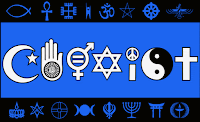An unforgivable sin is mentioned in Mark’s gospel where
Jesus says, “Truly, I say to you, all sins will be forgiven the sons of men,
and whatever blasphemies they utter; but whoever blasphemes against the Holy
Spirit never has forgiveness, but is guilty of an eternal sin.”
Matthew’s version expands upon it a bit. “Therefore I tell
you, every sin and blasphemy will be forgiven men, but the blasphemy against
the Spirit will not be forgiven. And whoever says a word against the Son of man
will be forgiven; but whoever speaks against the Holy Spirit will not be
forgiven, either in this age or in the age to come.”
It is interesting that the “unforgivable sin” is not some blatantly
immoral act like genocide, torture, child abuse or voting for Donald Trump. It
is not something one does; it is something one says. Yet it is not thoughtlessly
saying “You fool!” in the heat of the moment. It is speaking against the Spirit
because one’s heart is set against the Spirit. Words are a window into the
heart. As Jesus said, “Out of the
overflow of the heart the mouth speaks.”
The context of Jesus’ pronouncement of an “unforgivable sin”
is important. The statement is given during an altercation between Jesus and
some Pharisees. These devout, religious believers were telling people that
Jesus’ ministry was not inspired by the Spirit of God but by Beelzebul, the
prince of demons. In other words they were saying that Jesus was Satanic.
These Pharisees were so indoctrinated that they were unable
to recognize the Spirit of God in someone who was not part of their religious
group. Not only that, but they believed that anyone of a contrary religious persuasion
was evil. They labeled the work of the Spirit as demonic.
They could no longer tell the difference between good and
evil. As the prophet Isaiah warned, “Woe unto them that call evil good, and
good evil!” The Christian version of the unforgivable sin is not recognizing
the Spirit of God in other faith traditions. Some Christians go so far as to repeat
the sin of the Pharisees, labelling other religions demonic.
If we cannot recognize the Holy Spirit in the Buddhists like
Thich Nhat Hanh, then we do not know the Spirit who was in Christ. If we do not
see the Holy Spirit in the Hindus like Ramana Maharshi, we do not know the
Spirit of Jesus. If we do not hear the Holy Spirit in the words of the Muslims
like Rumi, we cannot hear God’s Word anywhere.
That does not mean that all religions and religious leaders are
equal. Some faiths and faith leaders are more transparent to the Spirit than
others. Some are clean windows through which the Spirit shines. Others are
windows obfuscated by dogma, tradition, and legalism. But wash away the grime and you can glimpse
the omnipresent Spirit behind all windows.
To be unable to recognize Jesus when he walks the Emmaus
Road with us in the form of a person of another faith is spiritual blindness. But
is this unforgivable? That assessment sounds like a “spiritually correct” form
of exclusivism and intolerance, until we see it is not a matter of whether God
forgives; it is a matter of whether we are open to forgiveness. If we are blind
to our own blindness, then we see no need for forgiveness. That is the
definition of unforgivable.
For some Christians, acknowledging that God is present in
other faiths is considered the unforgivable sin. It is thought to be a betrayal
of the Christian gospel. It feels to them like a denial of Jesus. It feels like
apostasy or heresy. It feels like unbelief, which some consider to be the unforgivable
sin. With their eyes and ears firmly clenched, they cannot discern the presence
of God.
But is this unforgivable? The God I know is Unconditional
Love. Nothing is unforgivable for Love except unforgiveness, as Jesus taught in
the Lord’s Prayer. Jesus prayed, “Forgive us our trespasses as we forgive those
who trespass against us.” He went on to explain, “If you do not forgive people
their trespasses, neither will your Father forgive your trespasses.” We receive
forgiveness to the extent that we forgive. Unable to forgive, we are unable to accept
forgiveness.
Are we willing to forgive those who will not accept our
religion? Are we willing to forgive those who do not understand God the way we do?
Are we willing to accept them as spiritual sisters and brothers? Are we willing
to forgive ourselves for our religious arrogance? Are we willing to forgive God
for transcending our religion and welcoming people of all faiths? If so,
nothing is unforgivable.











1 comment:
Forgot to sign my comment. So let me add to it! 😉😉 Upon reflection I really like your explanation because it fits the setting of Jesus’ struggle with the Pharisees and them claiming his power was from Beelzubub. Clearly that’s much more appropriate to the setting where He talks about the unforgivable sin. Thank you for that. I really enjoyed this blog post.
Sherri Wiggins
Post a Comment